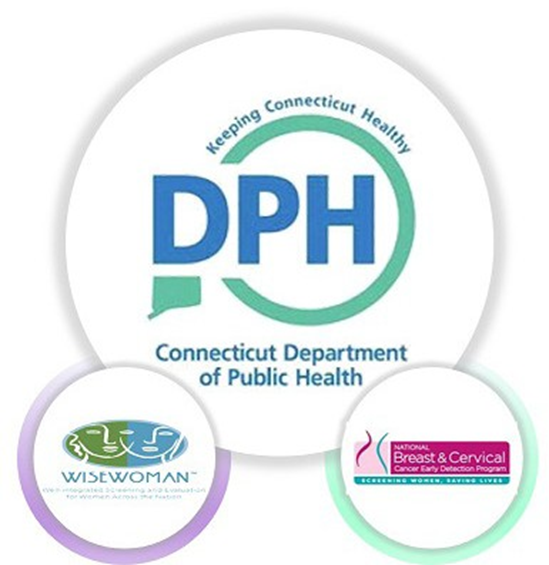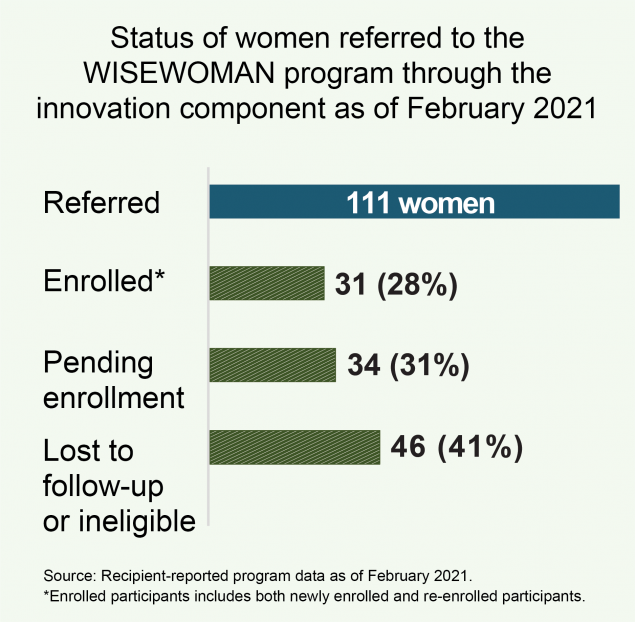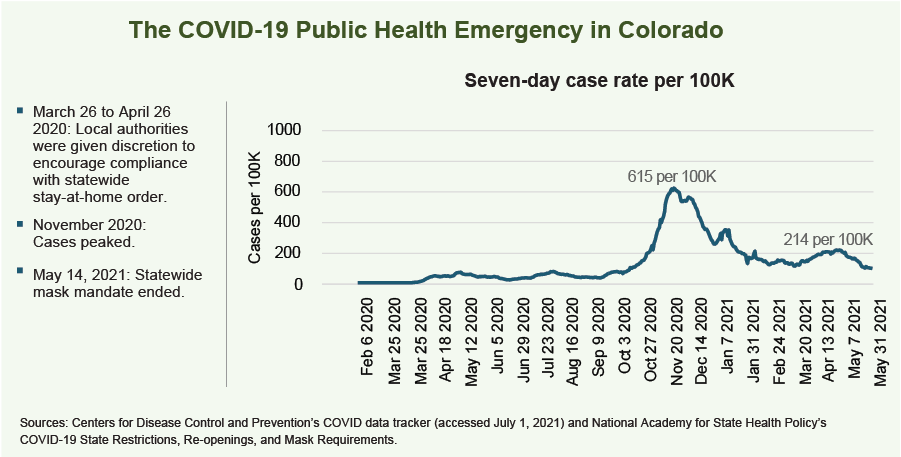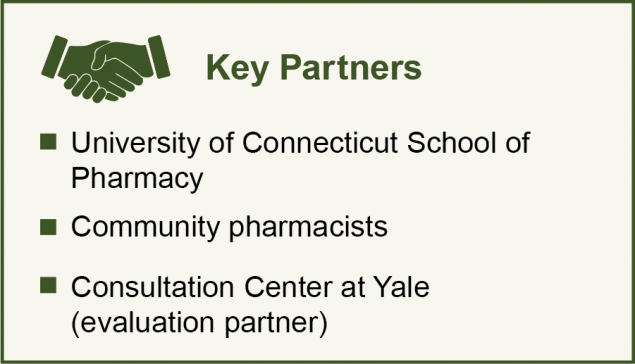Expanding Program Reach Through Community Pharmacists in Connecticut
WISEWOMAN Innovation Spotlight

Through its Innovation funding, Connecticut’s WISEWOMAN program seeks to identify additional avenues for identifying eligible WISEWOMAN participants, expand the team-based care model to enhance the role of the community pharmacist, and increase bidirectional referrals between WISEWOMAN and community pharmacies. Connecticut began implementation at the beginning of the COVID public health emergency in 2020. Figure 1 displays COVID case rates and timing of public health protective measures as important context that influenced the recipient’s program implementation progress.
- 1,460 women served, including 1,390 with a complete high blood pressure screening
- 86% of women identify as Hispanic, Black or African American, Asian or Pacific Islander, American Indian or Alaska Native, or multiracial
- 28% of women had hypertension at baseline screening
Source: Mathematica’s analysis of minimum data elements for women with a complete or high blood pressure screening in Years 1 and 2 (September 2018 to September 2020).
Notes: The national WISEWOMAN program defines hypertension as having an average systolic blood pressure of 140 mm Hg or higher, having an average diastolic blood pressure of 90 mm Hg or higher, or taking medication for high blood pressure.
How It Works

This bar graph shows the status of women referred to the WISEWOMAN program through the innovation component as of February 2021. 111 women were referred. Of these, 31 (28%) were enrolled (enrolled participants include both newly enrolled and re-enrolled participants); 34 (31%) were pending enrollment; and 46 (41%) were lost to follow up or ineligible. Source: Recipient reported program data as of February 2021.
Connecticut partnered with the University of Connecticut School of Pharmacy to train pharmacists as academic detailers. “Academic detailing is interactive educational outreach to physicians to provide unbiased, non-commercial, evidence-based information about medications and other therapeutic decisions, with the goal of improving patient care. It is usually provided to clinicians one-on-one in their own offices.”1 Once trained, these academic detailers trained community pharmacists on the WISEWOMAN program requirements and offerings.
After three training visits, a pharmacy is considered fully detailed and ready to serve as a referral site. Pharmacists then identify customers who might be eligible for the WISEWOMAN program, give them information about the program, and provide referral information to the WISEWOMAN navigation teams. The navigation teams then reach out to the women to enroll them into the program and schedule a screening with either the navigation team member or another clinical provider.
Connecticut initially planned for participant identification to occur during face-to-face interactions between pharmacists and potential clients. As a result of the COVID-19 public health emergency (PHE) that began in March 2020 (see Key Partners box), however, Connecticut pivoted to a new approach in which pharmacy students conduct the initial outreach to potentially eligible pharmacy customers by phone.
Achievements to Date
Increased connection to WISEWOMAN services. During a time when traditional in-person outreach efforts were limited by social distancing guidelines, the Connecticut Innovation recipient was able to pursue a new method for identifying and enrolling WISEWOMAN participants.
Program staff noted that the innovative work has “enhanced people’s ability to learn about and be referred and screened for the program.” Connecticut reported that 111 women had been referred to the program through the innovative work as of February 2021; of these, 31 women had been enrolled.
Expanded the role of community pharmacists in public health interventions. Connecticut’s WISEWOMAN program, in collaboration with the University of Connecticut School of Pharmacy, reported contacting 137 pharmacies, 21 of which had received all three training visits by one of the academic detailers.
Partner staff said that this collaboration with the WISEWOMAN program had provided an opportunity to more systematically integrate community pharmacists as referral partners and care team members for public health interventions.
Figure 1. The COVID-19 Public Health Emergency in Connecticut, February 2020 to May 2021

A graph titled The COVID-19 Public Health Emergency in Connecticut, charting the seven-day case rate per 100 thousand people, February 3, 2020, through May 31, 2021. The case rate remained at zero from February 3 to March 20, 2020. An initial stay at home order was enacted on March 23. Cases spiked initially in April 2020 and climbed to 216 per 100 thousand by May. Case rates then declined and remained near zero until October, when they began climbing again, peaking at nearly 400 per 100 thousand by November 28 and 547 by December 21. Case rates dropped to around 300 by January 1, 2021, then rose again to 592 by the end of January. From that point, case rates began a steady decline. On March 19, 2021, the governor began lifting some restrictions. Case rates dropped to 243 per 100 thousand by the beginning of April and were at near zero by May 31. Sources: Centers for Disease Control and Prevention’s COVID data tracker (accessed July 1, 2021) and National Academy for State Health Policy’s COVID-19 State Restrictions, Re-openings, and Mask Requirements.
Related Resources
Other Organizations
References
- National Resource Center for Academic Detailing. (2017). Introductory Guide to Academic Detailing [PDF – 242 KB].
- Centers for Disease Control and Prevention. COVID Data Tracker. Atlanta, GA: U.S. Department of Health and Human Services, CDC. Accessed July 1, 2021.
- National Academy for State Health Policy. 2020 COVID-19 State Restrictions, Re-openings, and Mask Requirements. Accessed July 1, 2021.

